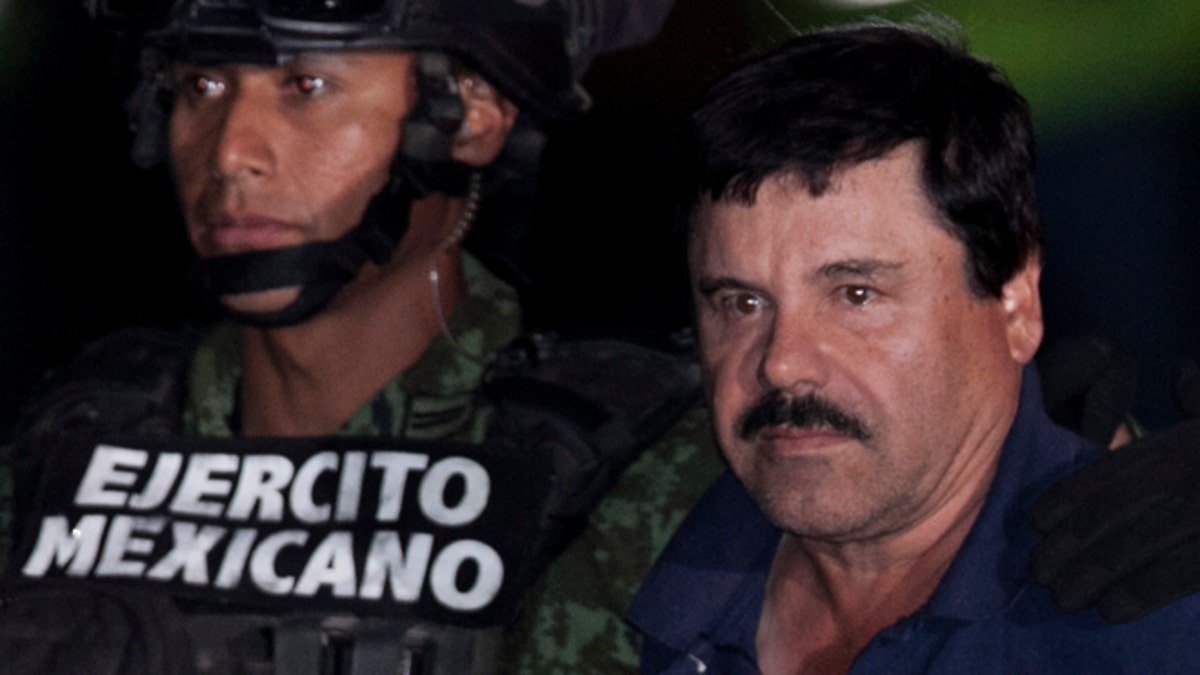
Joaquín Guzmán is escorted by soldiers and marines in Mexico City, Friday, Jan. 8, 2016. (ap)
Mexican drug lord Joaquin "El Chapo" Guzman has been shuttled from cell to cell every few hours. The bars of his cells have been reinforced, the prison floors have been strengthened with three-quarter-inch steel rods and a guard watches his door 24/7 in case a tunnel entrance appears suddenly.
K-9 dogs even taste his food before he does to make sure it doesn't contain poison, according to the New York Post.
They are all unprecedented measures to to avoid further embarrassment after drug lord Joaquín "El Chapo" Guzmán’s previous escape from the high-security Altiplano prison. This time, after being held in the same prison the Sinaloa boss escaped from in July of last year, Mexican officials are taking no chances this time.
But the large amount of resources pouring into this extraordinarily effort is not sustainable, experts say. And the sooner he is extradited to the U.S., experts say, the better.
Jason Marczak, deputy director of the Adrienne Arsht Latin America Center at the Atlantic Council, told Fox News Latino, "Even if he is in the highest-security prison in Mexico, the officials want him off their hands."
Security around the prison has been ramped up – road blocks on the roads leading to the penitentiary, as well as tanks and soldiers have been added along the perimeter – to guard against a possible raid.
Prison officials also move Guzmán into a different cell every few minutes or every hours in an effort to confuse the confined drug lord and any would-be-escape-collaborators. In the first five days after his capture in early January, Guzmán was transferred a total of seven times.
The prison has installed 400 new cameras throughout the prison – officials hope to add another 600 by April – and guards with cameras mounted on their helmets follow Guzmán everywhere he goes.
Mexico's National Security Commission has also reportedly installed motion sensors, some of which can detect underground activity, in the prison.
Even Guzmán’s food is under surveillance. First, it’s tasted by a dog to make sure that no one poisons the drug lord.
And, should worse comes to worst, the dogs’ proximity to El Chapo would allow them to recognize his scent in the case of another escape.
While it’s clear that Mexican officials have taken major precautions to prevent Guzmán from breaking free, experts say there is no way that Mexico will be able to keep up with the effort, both financially and strategically, for very long.
"...It's definitely extraordinary," the Atlantic Council's Marczak told FNL. "The question is, 'Is it sustainable?' I just can’t see 20 years of this."
Most experts agree that Guzmán’s extradition to the U.S. to face drug trafficking charges will be a smooth affair in terms of agreement between officials in Mexico City and Washington, but that doesn’t mean the drug lord will be heading north of the border overnight.
A court order filed by Guzmán's lawyer, Juan Pablo Badillo, in the weeks following the drug lord's escape from the maximum security Altiplano prison argued that if Guzmán was extradited to the United States, he would likely be tortured to force a confession to crimes for which U.S. authorities have accused him.
Over a dozen cartel leaders – including high-ranking ones – have been extradited to the U.S. from Mexico since Guzmán’s escape last year. Experts say the extraditions were a move by Mexico to try and make up for the embarrassment of El Chapo’s escape.
"It's all a matter of politics," Eric Olson, associate director of the Latin American program at the Woodrow Wilson Center, told FNL. "There is, however, an understanding that the U.S. will see Guzmán extradited."
Guzmán was recaptured during a raid by Mexican Marines on January 8, which took place in the city of Los Mochis on the Pacific coast. During the raid, five suspects were killed and six – including Guzmán – arrested.
